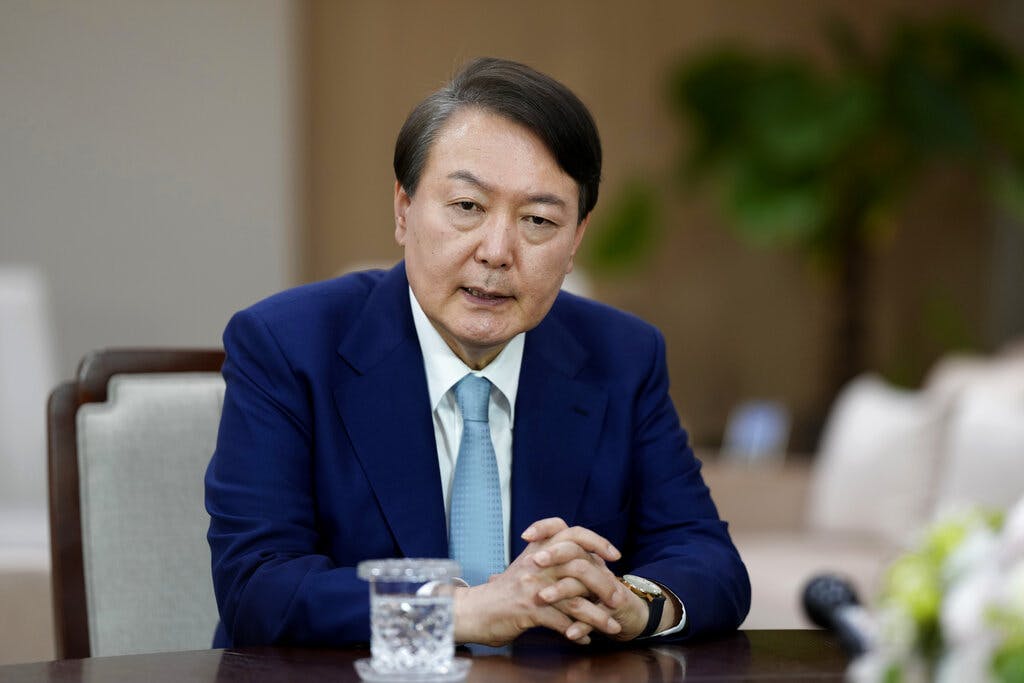South Korean President Faces Awkward Questions After Leaks Disclosed America Spied on Him
Until he gets answers, the conservative Yoon needs to parry the taunts and demands of his political opposition, whose leader, Lee Jae-myung, lost the presidential election in March 2022 by less than a percentage point.

President Yoon of South Korea, when two weeks hence he meets President Biden at the White House, will have one overwhelming question beyond that of the future of the alliance and America’s commitment to defense against North Korea: Were American intelligence agents really spying on their South Korean ally — and, if so, why?
So far the South Koreans are saying, officially, that the story of the leaked intelligence documents is basically a hoax — “groundless and untrue,” is the response from the presidential staff.
Moreover, the statement promised, “Going forward, we will further strengthen the trust and cooperative system between the two countries through an ironclad Korea-U.S. intelligence alliance.”
Just to prove the point, Mr. Yoon’s office noted that the president now works from the former Yongsan military base in central Seoul and not from the historic Blue House, from which he moved the entire presidential complex at the outset of his five-year term last May.
The new office, as a military facility, “has established and operated a wiretapping prevention system that is much stronger than that in the past,” according to a formal statement.
The official explanation was less than convincing, though, considering that the White House and the Department of Defense are saying an intensive search is under way to find the culprit or culprits behind what may be the biggest leak in a decade.
Remember the case of Edward Snowden, on contract for the National Security Agency, who unloaded a treasure trove of secrets on a team of journalists in 2013? He’s now out of reach of American law, a Russian citizen living in Moscow.
Then there was Chelsea Manning, the woman who was then an enlisted man in the American army, dumping secret files on Wikileaks in 2010.
Just to allay Korean concerns, the American defense secretary, General Lloyd Austin, discussed the leaks by phone Tuesday with Korea’s defense minister, Lee Jong-sup. Exactly what they said wasn’t disclosed, but presumably General Austin briefed him on the intensive search for the source of the leak.
Until he gets answers, the conservative Mr. Yoon needs to parry the taunts and demands of his political opposition, the liberal Minjoo or Democratic Party, whose leader, Lee Jae-myung, lost the presidential election in March 2022 by less than a percentage point. Mr. Lee and his party have seized upon the scandal to pillory the government’s relationship with Washington.
Mr. Lee, in a talk this correspondent attended at the Seoul Foreign Correspondents’ Club, played the role of statesman, saying he hoped the government’s claim that the documents were faked was true, but he obviously was ready to pounce on the story.
“The objective circumstances show that it’s difficult to exclude the possibility that the eavesdropping actually took place,” he said. “The reports, if true, would be very damaging to the South Korea-U.S. alliance — based on trust,” he said.
At the least, he said, the Americans would have to issue a formal apology.
Now the Koreans are amending their story somewhat, saying only that “some of the leaked U.S. documents were fabricated.” Mr. Yoon might love to let it go at that, but he will have to approach the Americans with a mixed message — or maybe a message with a question.
The message will be that he’s in accord with American policy on Korea and looks forward to further joint military operations, all of which will prove the American cliche about relations with Seoul — “There’s no daylight between us.” Then will come the question: Mr. President, what were those CIA people really doing eavesdropping on meetings with me and my ministers, and why?
We’re already getting some of the answers. Korea’s national security council reportedly was overheard discussing what to say to American entreaties for Korea to provide much-needed ammunition for beleaguered Ukrainian forces.
Considering that South Korea ranks as one of the world’s major arms manufacturers, the question was embarrassing to Mr. Yoon for two reasons. While Korea exports arms and ammunition, policy prohibits sending weapons to countries at war. Second, no one wants to upset Moscow — or Beijing — just for the sake of solidarity with Korea’s American ally.
Mr. Yoon’s advance team is now in Washington looking for explanations. The first deputy director of national security, Kim Tae-hyo, took off Tuesday on a five-day mission laying the groundwork for the visit, including not only the summit with Mr. Biden but also the address that Mr. Yoon is to deliver before both houses of Congress the next day, April 27.
At the airport before taking off, Mr. Kim dodged direct answers as reporters pummeled him with questions. “This is a matter of the U.S.,” he told the Korean press. “Its authorities will begin investigating what happened and who’s behind this, and it will take time.”

